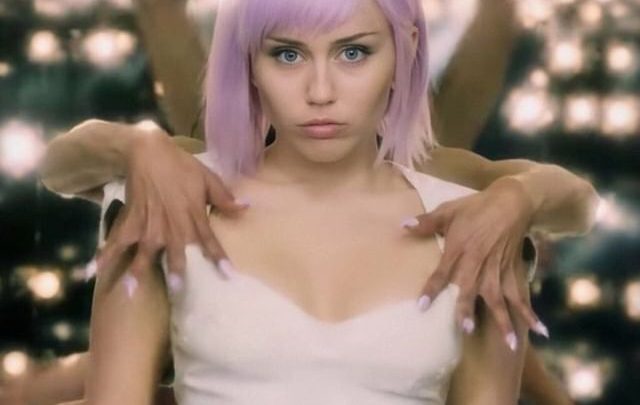Netflix Review: In defence of Ashley O
Not even Black Mirror can make pop music evil.
 IMDb
IMDbCreated by: Charlie Brooker
Starring: Miley Cyrus, Angourie Rice, Madison Davenport
Spoilers for Black Mirror’s “Rachel, Jack, and Ashley Too” ahead.
“Rachel, Jack and Ashley Too” had all the ingredients for a great episode of Black Mirror: a famous guest star, a potentially sinister AI, and a seemingly normal, relatable main character. Instead of putting it together into the excellent package the series is known for, the writers fumbled the execution. The result is an unexpectedly misogynistic take on pop music that paints teenage girls as the real enemy. Even Miley Cyrus’s great performance couldn’t save me from disappointment.
Rachel is a lonely teen in a new school. She finds a role model in Ashley O, a pop star who encourages fans to be themselves and overcome anxiety and self doubt. The biggest problem with the episode is that there is nothing evil about Ashley O, despite the writers implying otherwise. Her lyrics are literally about self-confidence and achieving your goals. There isn’t even a hint of a dark message between the lines.
Ashley Too is the Alexa-like AI assistant based on Ashley. One major twist is that every Ashley Too is a complete copy of Ashley O’s mind, but this was hardly exciting. Black Mirror has been pulling that trick since “White Christmas” in 2014, and it’s getting old.
Ashley Too encourages Rachel to follow her dream of entering her school’s talent show, and helps her prepare for it. By the end Rachel both looks great and delivers a great performance. Although she ends up slipping during her performance and feeling embarrassed, the alternative would have been not trying and to continue feeling lonely, which is hardly a better outcome.
The final act of the episode, Rachel and her older sister Jack rushing to free Ashley, plays like it was ripped from a Disney Channel Original Movie. The conclusion is disappointingly predictable. The worst moment comes in the last scene. After leaving an Ashley Fuckin O (as she becomes known, to make it overly clear she’s become edgy and authentic) concert, two teens are rife with melodramatic disgust. It slaps viewers in the face with the convoluted moral of the story, in case you somehow missed it: teen girls are foolish for liking pop music.
Aside from the misogyny, Catherine’s (our villain and Ashley’s aunt/mom-ager) motivations for drugging Ashley don’t make sense. If Ashley is experiencing writer’s block, wouldn’t it be far easier to just hire a songwriter to work with? This is, after all, a common practice in the music industry. If her motivation is more money, why doesn’t she use her connections and success in the biz to find other artists to manage? She isn’t completely wrong though: pop artists who drastically and suddenly change their sound typically don’t do well. Cody Simpson, for instance, was a relatively successful pop artist that went indie; after one album he flopped and essentially vanished from the music industry.
“Rachel, Jack and Ashley Too” joins an over-worn canon of recent movies and TV shows about the supposed evils of pop music. Following recent films, like A Star is Born and Vox Lux, the story proves reductive and tired, especially when compared to the usual high calibre of Black Mirror’s writing. These stories are all based on the assumption that pop music is inherently vacuous and meaningless; that it poisons the minds of listeners, unlike music that’s coded as “authentic,” like rock and country. This simplification disregards the artists that love making pop music and the fans that find meaning and community within it. A film that actually takes pop music seriously would be more interesting and subversive.
It’s also no coincidence that all these films feature female pop stars; women are continuously portrayed as music industry puppets, whereas men are artists in charge of their own creative outputs. This mirrors the marginalization of women in the actual music industry, who are rarely given equal respect or credit compared to their male counterparts.
Black Mirror adds nothing new to this trite narrative, aside from throwing in a fun, benevolent AI. Its portrayal of pop music with the struggling solo artist trying to escape their manager is disappointingly old-fashioned. K-pop alone could have offered much better futuristic material to pull from. Besides, if the writers want us to hate pop music, they should stop producing such excellent soundtracks. “On A Roll” is a certified banger. It has the kind of fun choreographed video we haven’t seen from most American artists in years.
Although meant to be dark and futuristic, Ashley O is only scary if you’re afraid of trap beats, synths, and teenage femininity.




